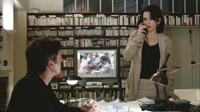

 | 
| |
| Home | Profile | Search | Help | Logout | Film Archives | Feature Archives | |||
| 2005 NYFF Films Introduction Good Night, and Good Luck Regular Lovers The Death of Mr. Lazarescu Methadonia L'Enfant (The Child) Avenge But One of My Two Eyes Bubble The Squid and the Whale I Am Capote Something Like Happiness Sympathy for Lady Vengeance Manderlay Tale of Cinema Breakfast on Pluto Through the Forest The President's Last Bang Who's Camus Anyway? Three Times Paradise Now Tristram Shandy Gabrielle The Sun The Passenger Cache (Hidden) | Caché Michael Hanneke, France/Austria/Germany, 2005 117 min.  The title of this engrossing and disturbing new Haneke film is ironic. At the end of the film, George Laurent (Daniel Auteuil) tells his wife Anne (Juliette Binoche) that he will be "caché," hidden, and he takes off his clothes, closes the curtains, and buries himself in bed. It's afternoon. But he will be exposed, as before. Caché is about how you can't hide. Auteuil, an actor who naturally looks worried and put-upon, and Binoche, who has a vulnerable and frightened look, play a privileged couple whose son Pierrot (Lester Makedonsky) at twelve is a star swimmer. George has a literary TV program (like "Le Bouillon de la Culture"), which, in France, makes him a star. They have a beautiful house in an elegant suburb of Paris. (His childhood home, we learn, was a substantial farm.) Beyond all that are the poor suburbs, the slums, La banlieue, the place beyond the pale with its Arabs and blacks: the underprivileged, the mistreated, the ignored. Like Haneke's previous Code Unknown, Caché is about alienation and connection. This sounds theoretical and intellectual, but the uncompromising Austrian who makes films in French always finds a core of the most infinite desperation in his people. Code Unknown focused on chance meetings. Caché moves in closer to home, to this family whose peace is shattered. As the film begins they are getting increasingly menacing videos left on their doorstep that show they are being watched. George thinks he knows who it is. Caché blends urban angst with the primal horror of Greek tragedy. What goes around comes around. Heneke elliptically refers to a revelation of 20,000 Algerians the French cast into the sea. Georges has betrayed an Algerian playmate. Is this a thriller? Maybe: it has a thriller's progressive unease. But Haneke, a great director in good form here, has produced something as intellectually challenging as it is emotionally troubling. He operates without the help of surging background music, jump cuts, or snappy chases. And as the final credits roll, the scene (upon which we are again voyeurs, as when the film began), shows us that nothing is resolved. A highly original artist, Haneke continues to explore. (Chris Knipp) |
|